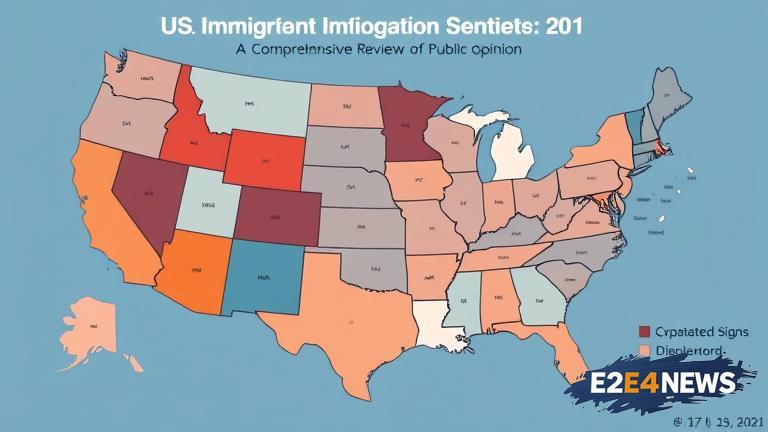The debate over immigration in the United States has been a longstanding and contentious one, with opinions on the matter varying widely across the country. In order to better understand the complexities of American attitudes towards immigration, it is essential to examine the various factors that influence public opinion on this issue. Recent surveys and studies have shed light on the ways in which Americans think about immigration, revealing a multifaceted and often contradictory landscape of opinions. On one hand, many Americans express concerns about the economic and cultural impacts of immigration, with some arguing that it poses a threat to national identity and job security. On the other hand, others see immigration as a vital component of American society, citing its contributions to economic growth, cultural diversity, and the country’s founding principles. The role of border security is also a major point of contention, with some advocating for stricter controls and others pushing for more lenient policies. Furthermore, the issue of undocumented immigration has sparked intense debate, with some arguing that it is a matter of national security and others seeing it as a humanitarian concern. The impact of immigration on local communities is another key aspect of the discussion, with some areas experiencing significant demographic shifts and others remaining relatively unaffected. The media’s coverage of immigration has also been criticized for its potential to shape public opinion, with some arguing that it perpetuates negative stereotypes and others seeing it as a necessary platform for raising awareness about the issue. In addition, the political landscape of immigration has become increasingly polarized, with different parties and ideologies often holding diametrically opposed views on the matter. Despite these challenges, there are also many areas of common ground, with a significant majority of Americans agreeing that immigration is a vital part of the country’s identity and that it has the potential to bring numerous economic and cultural benefits. However, the question of how to balance these benefits with the need for effective border security and fair treatment of undocumented immigrants remains a major point of contention. Some have argued that a comprehensive overhaul of the immigration system is necessary, while others advocate for a more incremental approach. The use of technology, such as advanced surveillance systems and biometric identification, has also been proposed as a potential solution to the challenges posed by immigration. Moreover, the importance of addressing the root causes of immigration, such as poverty and violence in countries of origin, has been highlighted by many experts. Ultimately, the complexities of American attitudes towards immigration reflect the diverse and often conflicting values and interests that exist within the country. By engaging in a nuanced and informed discussion about the issue, it is possible to work towards a more comprehensive and effective immigration policy that balances competing concerns and priorities. The need for greater public awareness and education about the facts of immigration has also been emphasized, as well as the importance of fostering a more inclusive and empathetic national conversation about the issue. As the debate over immigration continues to evolve, it is essential to prioritize a solutions-oriented approach that takes into account the wide range of perspectives and experiences that exist within American society. By doing so, it may be possible to build a more just and equitable immigration system that reflects the values of fairness, compassion, and opportunity that are central to the American identity. The role of community-based initiatives and grassroots organizations in promoting greater understanding and cooperation on immigration has also been highlighted, as well as the need for greater international cooperation and diplomacy to address the global challenges posed by migration. In conclusion, the issue of immigration in the United States is a complex and multifaceted one, reflecting a wide range of competing values, interests, and priorities. By engaging in a nuanced and informed discussion about the issue, and by prioritizing a solutions-oriented approach that takes into account the diverse perspectives and experiences that exist within American society, it may be possible to build a more just and equitable immigration system that reflects the country’s founding principles of freedom, opportunity, and inclusivity.
